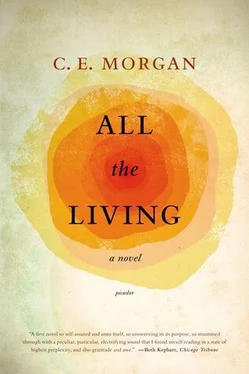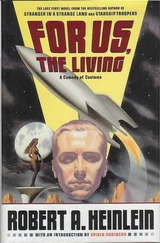When the boys crossed the last tracks and finally pulled into the school lot, they tumbled from the white van, yanking agricultural placards and pamphlets from the rear seats, and the teachers rushed forward to help them. Aloma followed, ostensibly to carry posters, but really to look at the boys and watch them move about in their Wranglers and boots with their caps pulled low and earnest over their brows. Only the boy who had driven stood still by the front wheel well and leaned against the van, keys dangling from a crooked finger that appeared to have been broken and never properly set. When Aloma stood by the van door waiting to be handed a pile of posters, she stole a look at him, but he was already glancing sideways at her and she thought that was wicked and could not help but like it. When she walked back into the building, a WHERE’S THE BEEF? poster balanced on her forearms, she wondered if he was looking at her from behind as she walked away and if she’d turned around, she would have seen that he was.
Inside the building she stood with her back to the auditorium door, biting her nails and eyeing the presentation on nitrogen and manure, but really thinking about the boy and his sideways glance. She looked around at the tiny auditorium, at the students with their young eyes cast up at the Aggies with their placards. Then she bit one nail to the quick to hurt herself properly, startling herself into action, and she slipped out the main door. He was still where she’d left him, leaning against the van, only now his head was lowered a bit against the midafternoon sun. He looked bored. He was blue-eyed and commonfaced, not pretty.
She walked over to him, tried to look casual.
How come you’re not in there with them? she said.
How come you’re not? he said and she looked down quick and toed the pavement with her old tennis shoe. When she said nothing in response, he said, I ain’t much for that sort of thing. They work their mouths a whole lot. They mess around. He waved his hand once.
Well, yeah, she said.
What’s your name? he said.
Aloma.
He smiled at her then and she smiled back before she could think of a reason why not to. My name is Orren Clay Fenton, he said and she liked his bookless voice and the way his vowels clung to the back of his throat.
What sort of name is that?
England names. All the Fentons got names like that. I got a brother named Cash, Cassius Linus, he said. He watched her. How old are you? he said.
Twenty next week.
He smiled again and she saw he already had wrinkles around his eyes even though he couldn’t be much older than she was. She wondered if he could tell that she didn’t know anything about anything. With one hand on her hip, she breathed in and looked up like she was looking at something just beyond his head, the weathered skeletal shape of the trees or the blue sky, and then she sighed.
Well, I got to go back in, she said. It was good talking to you.
But we ain’t hardly talked yet.
She gave him a look that had no meaning other than to look at his face again, but he divined something there that he liked, because he said, What if I come back?
What’s that mean? she said and her hand unhooked from her hip and hovered birdlike at her side.
He tipped his cap up on his head and then, as if suddenly remembering it was there, he took it off and passed a hand through his band-pressed hair. His brown hair shone reddish in the sunlight and it reminded her of the flank of a brown horse her uncle’s neighbor had owned, the way the sun petted it as it moved its weight, rubbing its sides on the wood of the fence, first one side, then the other.
What if I come back and took you out?
Took me out where?
I don’t know. I ain’t from here. Wherever you want to go to.
I’m not from here either, she said.
Well, that’s interesting to know, but that ain’t a answer.
She laughed.
Maybe, she said.
Come on now, he said.
She eyed him straight then and unsmiling like a boy would and she saw the yellow edging the iris of one blue eye. Well, suppose I say yes and then you don’t come back? I’d be smart just to wait it out and see what you do. That way I don’t have to play the fool. Still she did not smile, but she turned her head sideways, offered him her profile.
He grinned and propped his cap back on his head again. Then he took a cigarette out of the breast pocket of his tee shirt, watching her, and one finger fished for matches in his pocket. He found none there and so he just stuck the cigarette lightless between his lips and a tiny twig of tobacco fell from its packed end. She took a few steps back toward the school without really turning from him. He watched her dance back a pace and he shook his head. I’m coming back, he said.
When?
Soon’s I drop these yokels off, I’m coming back.
Tonight? she said, incredulous.
Hell yes, tonight, he said. I can see you ain’t nobody’s fool.
He did come back, and he came back again every other day after that. When classes were over in the afternoon and he was freed from work on the college farm, he showered, combed his wet hair, and tore through the three counties that separated them. He took her out in his truck as the sun was going down, and because he didn’t know where he was going and neither did she, they went nowhere in particular. They just drove and he told her how big a farm he was going to own someday — bigger, much bigger than the one he had grown up on — and how to cut the testicles on a sheep and brand the hindquarters of a cow and she told him how it was to play a piano for a room full of people, to commit reams of music to memory. She liked the way he was silent and attentive when she talked about the piano, as though she were telling him about a country he had never seen. He nodded his head, his lips pressed together, and she studied his face like a score. But when she spoke, she could not really hear her own voice, but only imagined what all lay behind the press of those lips. And when the night grew late, they drove down the mountain roads to the blackened campus of the settlement school, where instead of dropping her off he parked his truck and the instant he took his hand from the steering wheel, before she could know what that hand was going to do, she scooted over and practically straddled his lap. She did not know what gave her the nerve. She’d never done a thing but kiss a boy once after a community dance and let him sneak his hand up the length of her shirt, but it took his hand forever to get where it was going and then, like an exhausted runner, it had collapsed on the finish line and didn’t move but only cupped one breast. Orren’s hands had considerably more endurance.
Does this mean I can come back? he said after they had kissed for two hours. She nodded, but they did not stop until the birds called for dawn.
He came back again and again and they took their drives into the mountain darkness. It was not more than two weeks before their kissing gave way to nakedness and her body gave way to his. When he pushed up inside her for the first time, she was unable to move for the surprise of it, not because it was unexpected — she had anticipated it in the unthinking way the body has of presuming its physical destiny — but because it brought the fact of Orren into a proximity she had not previously imagined. Within, but without at the same time and his face more open and more unreachable than she had imagined a face could be. It moved her in a way that had nothing to do with pleasure. That and the way, when he was inside her and reaching and speaking into her hair, he made cuss words sound like praise words. She took for the first time an understanding of what it meant to have pleasure bound up in pain, like a gift in paper. And when there was pain, which there was at first and occasionally after, she was always surprised that she did not want to end it, as if her body knew to push through any hurting for some goal that she could not understand but knew to be there. The goal was not Orren himself, though she wanted him; it was something that she could strive for only through the striving of his body, his body which she held inside her, accepting it sometimes hurting and sometimes not.
Читать дальше
Конец ознакомительного отрывка
Купить книгу











